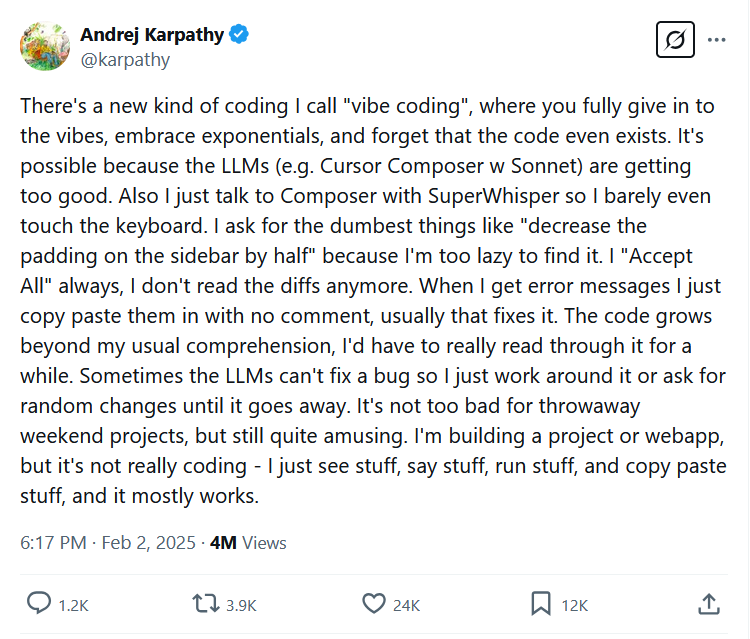For many individuals, coding is about telling a pc what to do and having the pc carry out these exact actions repeatedly. With the rise of AI instruments like ChatGPT, it is now potential for somebody to explain a program in English and have the AI mannequin translate it into working code with out ever understanding how the code works. Former OpenAI researcher Andrej Karpathy lately gave this apply a reputation—”vibe coding”—and it is gaining traction in tech circles.
The method, enabled by giant language fashions (LLMs) from corporations like OpenAI and Anthropic, has attracted consideration for doubtlessly decreasing the barrier to entry for software program creation. However questions stay about whether or not the strategy can reliably produce code appropriate for real-world functions, at the same time as instruments like Cursor Composer, GitHub Copilot, and Replit Agent make the method more and more accessible to non-programmers.
As an alternative of being about management and precision, vibe coding is all about surrendering to the movement. On February 2, Karpathy launched the time period in a put up on X, writing, “There is a new form of coding I name ‘vibe coding,’ the place you totally give in to the vibes, embrace exponentials, and overlook that the code even exists.” He described the method in intentionally informal phrases: “I simply see stuff, say stuff, run stuff, and replica paste stuff, and it principally works.”

Whereas vibe coding, if an error happens, you feed it again into the AI mannequin, settle for the modifications, hope it really works, and repeat the method. Karpathy’s method stands in stark distinction to conventional software program improvement finest practices, which generally emphasize cautious planning, testing, and understanding of implementation particulars.
As Karpathy humorously acknowledged in his unique put up, the strategy is for the last word lazy programmer expertise: “I ask for the dumbest issues, like ‘lower the padding on the sidebar by half,’ as a result of I am too lazy to search out it myself. I ‘Settle for All’ all the time; I do not learn the diffs anymore.”
For many individuals, coding is about telling a pc what to do and having the pc carry out these exact actions repeatedly. With the rise of AI instruments like ChatGPT, it is now potential for somebody to explain a program in English and have the AI mannequin translate it into working code with out ever understanding how the code works. Former OpenAI researcher Andrej Karpathy lately gave this apply a reputation—”vibe coding”—and it is gaining traction in tech circles.
The method, enabled by giant language fashions (LLMs) from corporations like OpenAI and Anthropic, has attracted consideration for doubtlessly decreasing the barrier to entry for software program creation. However questions stay about whether or not the strategy can reliably produce code appropriate for real-world functions, at the same time as instruments like Cursor Composer, GitHub Copilot, and Replit Agent make the method more and more accessible to non-programmers.
As an alternative of being about management and precision, vibe coding is all about surrendering to the movement. On February 2, Karpathy launched the time period in a put up on X, writing, “There is a new form of coding I name ‘vibe coding,’ the place you totally give in to the vibes, embrace exponentials, and overlook that the code even exists.” He described the method in intentionally informal phrases: “I simply see stuff, say stuff, run stuff, and replica paste stuff, and it principally works.”

Whereas vibe coding, if an error happens, you feed it again into the AI mannequin, settle for the modifications, hope it really works, and repeat the method. Karpathy’s method stands in stark distinction to conventional software program improvement finest practices, which generally emphasize cautious planning, testing, and understanding of implementation particulars.
As Karpathy humorously acknowledged in his unique put up, the strategy is for the last word lazy programmer expertise: “I ask for the dumbest issues, like ‘lower the padding on the sidebar by half,’ as a result of I am too lazy to search out it myself. I ‘Settle for All’ all the time; I do not learn the diffs anymore.”














